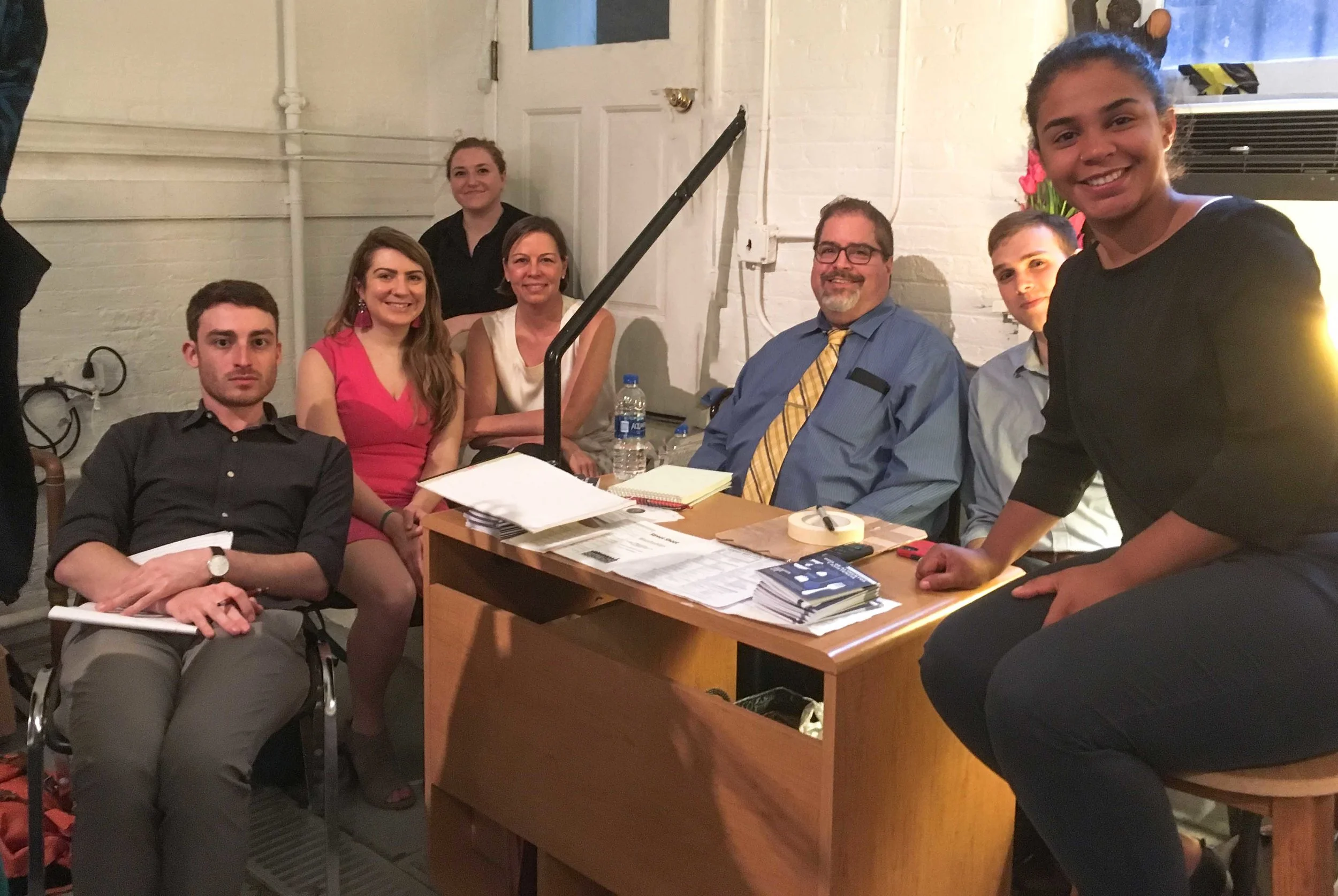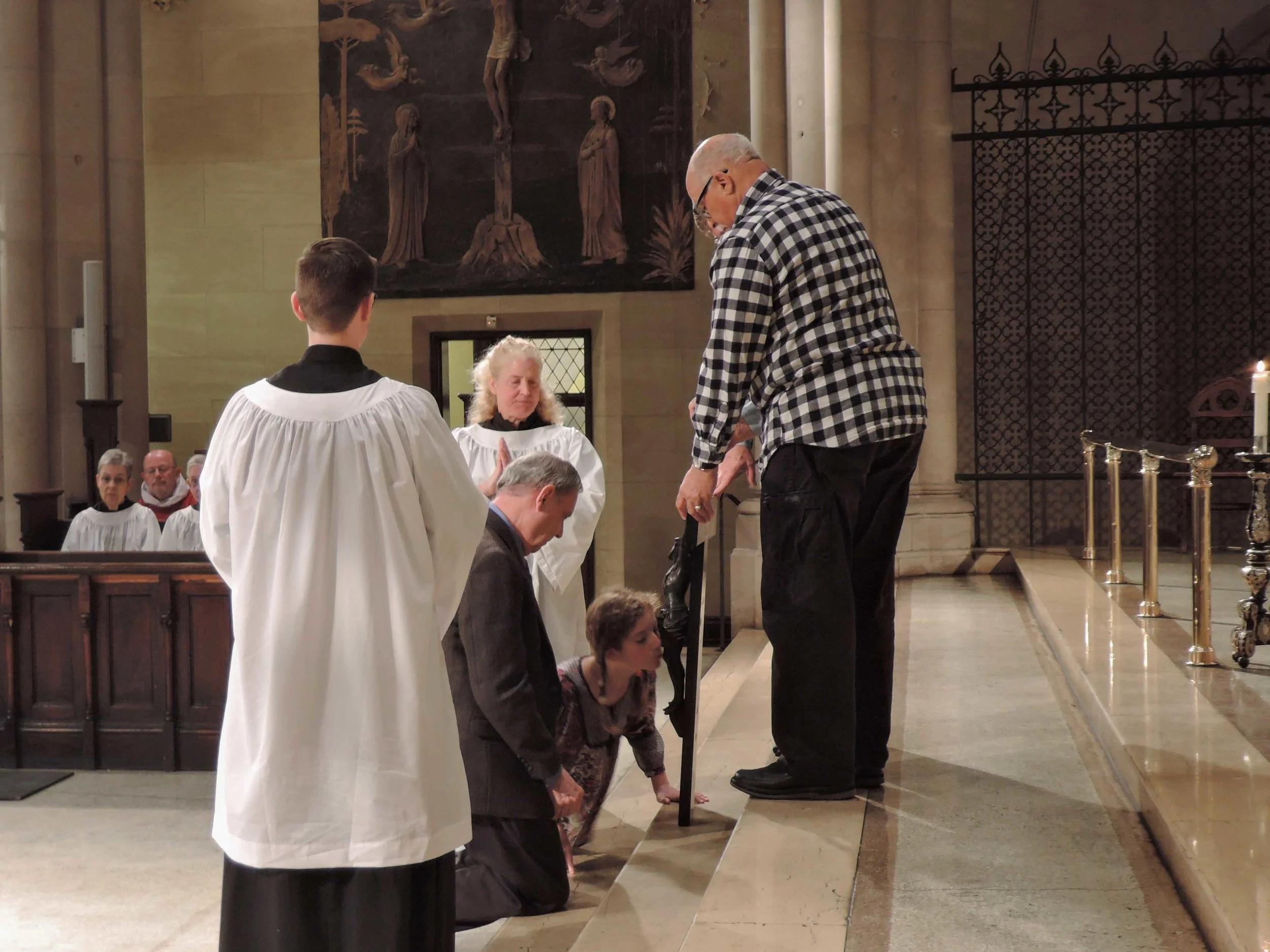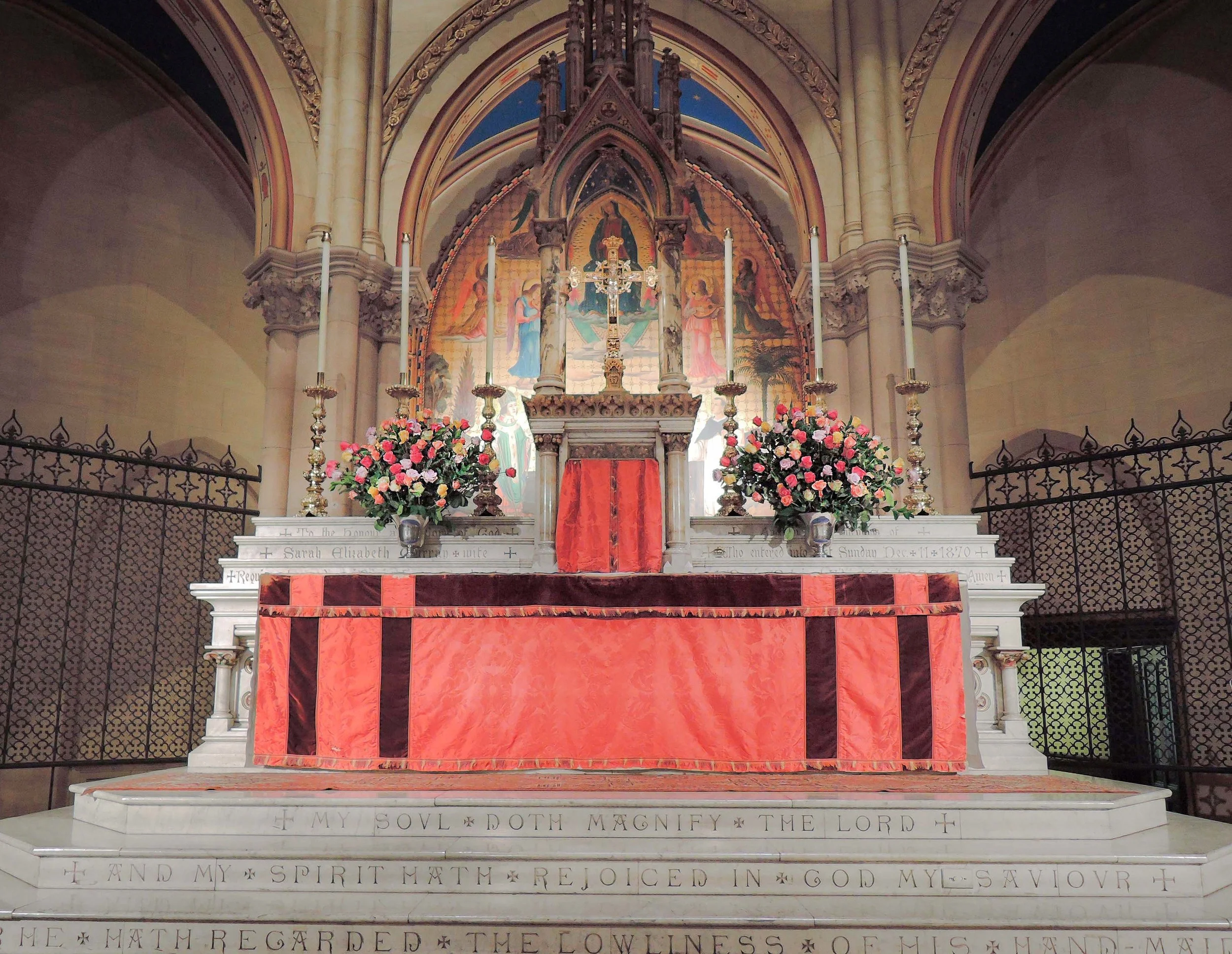The Angelus: Our Newsletter
VOLUME 20, NUMBER 33

FROM THE RECTOR: PRAYER BOOK NEWS
The good news is that the General Convention opted not to begin the process of replacing the Prayer Book. You can read the adopted resolution here. In addition to the General Convention's Standing Commission on Liturgy and Music, there is now to be a "Task Force on Liturgical and Prayer Book Revision"--and the enabling
VOLUME 20, NUMBER 32

FROM THE RECTOR: PRAYER BOOK REVISION
You know we may be in trouble when you click on the Episcopal News Service headline, "Committee Will Propose Comprehensive Revision of the Book of Common Prayer," and discover a picture of the committee members with this caption, "Members of the Committee to Receive the Report of Resolution A169, which is considering revision of the Book of Common Prayer, clap along while singing a hymn before the start of their morning meeting on July 5."
Read More
VOLUME 20, NUMBER 31

FROM THE RECTOR: RICHARD JOSEPH LEITSCH, 1935-2018
This is the homily I preached at the Burial of the Dead for Dick Leitsch on Thursday,
June 28, 2018. —S.G.
Rabbi Lord Jonathan Sacks was for over two decades a leader of part of the Orthodox Jewish community in the Commonwealth-what we Americans often call "The British Commonwealth of Nations," but it's simply "The Commonwealth." I follow his blog called Covenant and Conversation. This week his topic was "A People that Dwell Alone." He wrote about the revival of Anti-Semitism in Europe and elsewhere-and these are his words-"within living memory of the Holocaust." His starting point was a phrase from the fourth book of Moses, Numbers, "a people dwelling alone" (Numbers 23:9). He writes, "If people do not like you for what you are, they will not like you more for pretending to be what you are not." He summarized his reflection with these words, "In our uniqueness lies our universality. By being what only we are, we contribute to humanity what only we can give."
Read MoreVOLUME 20, NUMBER 30

FROM THE RECTOR: NATIVITY OF JOHN
The Feast of the Nativity of Saint John the Baptist, June 24, is a "Feast of Our Lord" that may be observed on a Sunday when June 24 is a Sunday. We did this in 2007 and in 2012. Because of how Easter Day falls and two intervening leap years, this possibility for a Sunday celebration of John's birth will not happen again until 2029.
John's birth is described by Luke in two short verses. Eight verses are needed by the evangelist to tell the story of the child being named "John." The great focus of this narrative is the song the evangelist places on the lips of John's father, Zechariah, a song we call, "The Song of Zechariah." It's also known by the first words of the Latin translation of the New Testament Greek, "Benedictus Dominus Deus," or simply the "Benedictus." These are the first words
Read MoreVOLUME 20, NUMBER 29

FROM FATHER SMITH:
"LISTEN, AND INCLINE THE EAR OF YOUR HEART"
Last Friday, I traveled to Holy Cross Monastery in West Park, New York, to attend the ordination of Brother Aidan William Owen, O.H.C., to the priesthood. The bishop of New York was the celebrant that morning. Sister Elizabeth Broyles, C.M.A., preached the sermon.
The ordination took place in the monastery chapel, a space where prayer is offered many times each day, as it has been for many years. Such sacred spaces, I often feel, are inhabited by the memory, and the power, of all that praying. At Holy Cross, it is as if the words of the Eucharist and the psalms--the heart of monastic prayer--hang there patiently in the chapel, just waiting to become audible once again.
Read MoreVOLUME 20, NUMBER 28

FROM THE RECTOR: SEEING DIMLY
On Corpus Christi Sunday, June 3, it was cloudy and just a little cool for a late spring day in New York City. Rain had been threatened, but it didn't appear. This year our route for the eucharistic procession was not around Duffy Square-the northern triangle of Times Square-but around a portion of the southern triangle, between Forty-sixth and Forty-fifth streets. About twenty minutes before our Solemn Masses on Palm Sunday and Corpus Christi, the MC
VOLUME 20, NUMBER 27

FROM THE RECTOR: NEW STUDY FOR CORPUS CHRISTI
The Reverend Dr. Stephen R. Shaver completed his doctorate in liturgical studies last year at the Graduate Theological Union, Berkeley, California. This month he begins his first position as a rector at the Church of the Incarnation, Santa Rosa, California. Our paths have crossed a few times. He was Fr. Louis Weil's last teaching assistant before Weil's retirement from the faculty of the Church Divinity School of the Pacific. Fr. Shaver has just published the first of a two-part article. Its title is "A Eucharistic Origins Story Part 1: The Breaking of the Loaf" (Worship 92 [May 2018], 204-21). I want to tell you about this first article and to say that I'm looking forward to reading part two.
Read MoreVOLUME 20, NUMBER 26

FROM FATHER SMITH: "BACK HOME" AND "OVER THERE"
When I was growing up Roman Catholic in my small town in Western New York in the middle of the last century, "the missions" were something that took place "over there," a long way from "back home." Only specially qualified people went to serve in the missions. They were mostly white, but we didn't notice that, because we were mostly white, too. Every once in a while a "missionary" would come to the parish on a Sunday to preach. He would talk about his work "over there" and would ask for donations to assist with his faraway labors.
Read MoreVOLUME 20, NUMBER 25

FROM THE RECTOR: PENTECOST BRETHREN
At the end of Luke, Jesus said to his apostles, "Stay in the city, until you are clothed with power from on high" (Luke 24:49b). In the Acts of the Apostles, on the day called "Pentecost" (from the Greek for "fiftieth"), the people of Jerusalem are celebrating a harvest festival, "the feast of weeks" described in Exodus 23:16, Leviticus 23:15-21, and Deuteronomy 16:9-12. But some are not. "They" (Acts 2:1) are together waiting for Jesus' promised gift, and on the day of the festival the gift arrives (Acts 2:2-13).
Read MoreVOLUME 20, NUMBER 24

FROM THE RECTOR: MITTIES MCDONALD DECHAMPLAIN, priest, 1948-2018
On Friday afternoon, May 8, the Reverend Dr. Mitties DeChamplain attended the noonday services here at Saint Mary's. Father Matt Jacobson, who is a physician and her former student at the General Theological Seminary, was celebrant. Sometime after the Eucharist was over, in her conversation with Matt, it was clear to him that something was wrong, that she was not herself. He called me. I brought Sr. Monica Clare and our bookkeeper, Kristie Raynor, an emergency medical technician, to the sacristy.
Read More
VOLUME 20, NUMBER 23

FROM THE RECTOR: SACRED, SECULAR, AND RELIGIOUS
Let me begin with the very happy news that on Tuesday, May 1, 2018, Sister Monica Clare, C.S.J.B., was elected by her community to make her vow of final profession as a sister of the Community of St. John Baptist. Her commitment to the religious life is a witness of God's continuing work through the church. Bishop Allen Shin, who serves as episcopal visitor of her order, will receive her vows at a service at their convent in Mendham, New Jersey, on Friday, June 8, 2018, at 10:30 AM. All are invited.
Read MoreVOLUME 20, NUMBER 22

FROM FATHER PACE: THEN & NOW
The High Altar, Sunday, April 22, 2018
Photo by Ricardo Gomez
The Saint Mary's AIDS Walk has been a major outreach effort of this parish for many years. The Team has begun its fundraising efforts in preparation for this year's Walk, which will take place on the Day of Pentecost, May 20, 2018. You may read more about the Walk, the Team, and its efforts below, in the paragraph entitled "AIDS Walk 2018." We invite you to view a video on YouTube, in which Team members speak about their commitment to this effort. We also encourage you to visit the Team's AIDS Walk webpage, where you can join the Team
Read MoreVOLUME 20, NUMBER 21

FROM THE DEACON: WALK IN THE LIGHT
Tuesday morning in Holy Week, I walked in the front doors of Saint Mary's and headed straight toward the back, a shortcut. Busy preparations for the Thursday and Friday altar of repose were already going on. In the pews, many homeless men and women had settled in for a day of undisturbed rest, guaranteed since the church had already opened. Most were sleeping, coats or blankets wrapped around them in that still-cold early hour. Coming in from the street with its
VOLUME 20, NUMBER 20

FROM THE RECTOR:
DAILY PRAYER
One memory from my seminary days that almost always brings a smile to my face is remembering that at Morning Prayer or Evensong (depending on the lectionary year), on the Friday of the second week of Easter, the lector for the week, a middler (a student in the second of three years), would have to read Daniel 3:1–18. It’s the first part of the story of Shadrach, Meshach, and Abednego being cast into the fiery furnace. They survive the furnace because of the intervention of their God (Daniel 3:19–30). Smirking—giggling—would begin early.
Read MoreVOLUME 20, NUMBER 19

FROM THE RECTOR: MORE THAN FRIENDS
In this lectionary year (BCP [1979], 904-06), the gospel appointed for the Eucharist on Easter Day was from Mark; on the third Sunday of Easter it will be from Luke. On the other Sundays in Eastertide the gospel is from John. This "fourth gospel"-so named, I think, because of its order in the New Testament canon, and because it is thought to be the latest of the four gospels-has a distinctive theological point of view on two issues of continuing relevance. Both invite us to think in a different way about our relationship to Jesus Christ and to each other. (One of those issues is the Eucharist-a subject for another day!)
Read MoreVOLUME 20, NUMBER 18

FROM THE RECTOR: RESURRECTION
In the gospels, the words about the Risen Lord were met at first with fear, confusion, and disbelief by all, except in the gospel of Matthew. In Mark, the empty tomb and the word of the resurrection bring fear and silence to the women who have gone to the tomb (Mark 16:1-8). They go inside the tomb. A young man tells them, " 'Do not be amazed . . . He has risen . . . go, tell his disciples and Peter that he is going before you to Galilee; there you will see him.' And they went out and fled from the tomb . . . and they said nothing to any one, for they were afraid."
Read MoreVOLUME 20, NUMBER 17

FROM THE RECTOR: HOLY WEEK 2018
The Right Reverend Allen K. Shin, bishop suffragan, will be with us as celebrant and preacher for the liturgies of Maundy Thursday, Good Friday at 12:30 PM, and the Great Vigil of Easter. But first, some words about the beginning of Holy Week.
In the Prayer Book Calendar, Holy Week begins with "The Sunday of the Passion: Palm Sunday" and concludes on Holy Saturday; the Easter Season begins on Easter Eve (BCP [1979], 31-32). As I write on Friday morning, March 23, it seems likely that we will be able to have a procession through Times Square as part of our Liturgy of the Palms at the Solemn Mass on Sunday. This will be my twentieth Palm Sunday at Saint Mary's-and we've only been rained out once.
VOLUME 20, NUMBER 16

FROM THE RECTOR: FEED ON JESUS
My thinking about the worship of Holy Week and Easter has continued to be shaped by a remark Jeffrey Lee made to me shortly after I became rector of Trinity Church, Michigan City, Indiana, in 1988. Jeffrey was then canon to the ordinary in the diocese of Northern Indiana. Since 2008 he has been the bishop of Chicago.
Read MoreVOLUME 20, NUMBER 15

FROM FATHER SMITH: A WITNESSING PRESENCE
For hundreds of years, many Christians believed that it was possible for the biblical text to mean more than one thing and that multiple meanings need not be in conflict. They firmly believed that a passage might have both a literal and a spiritual sense, or, indeed, more than one spiritual sense. As a result, biblical commentary became a complex and creative task. The Song of Songs seemed particularly to invite such readings. Medieval monks were aware
VOLUME 20, NUMBER 14

FROM THE RECTOR: CERTAINTY
Until the present Prayer Book was adopted, the last anthem prayed at the beginning of the Burial of the Dead was, "We brought nothing into this world, and it is certain we can carry nothing out. The Lord gave, and the Lord hath taken away; blessed be the name of the Lord" (BCP [1928], 324). The first of these combined sentences is from Job 1:21, the second 1 Timothy 6:7. This anthem was replaced in the traditional language rite of the Prayer Book with these words,